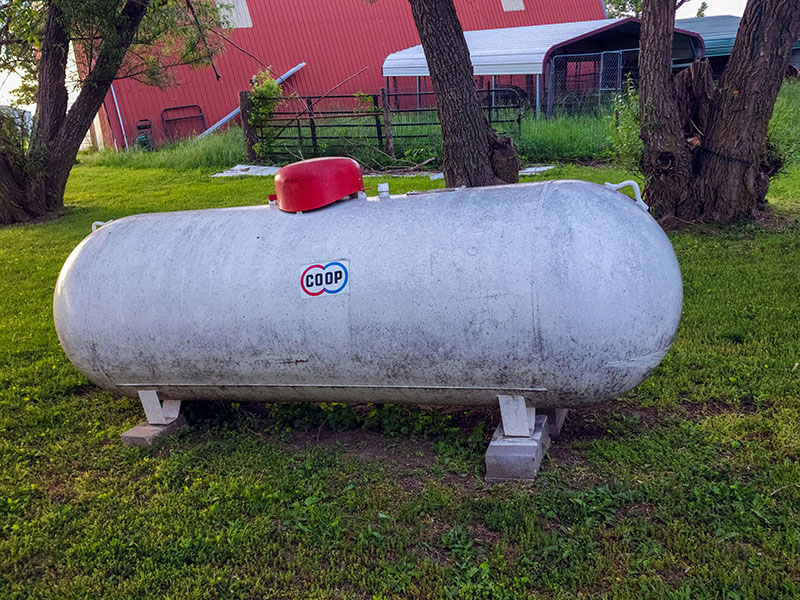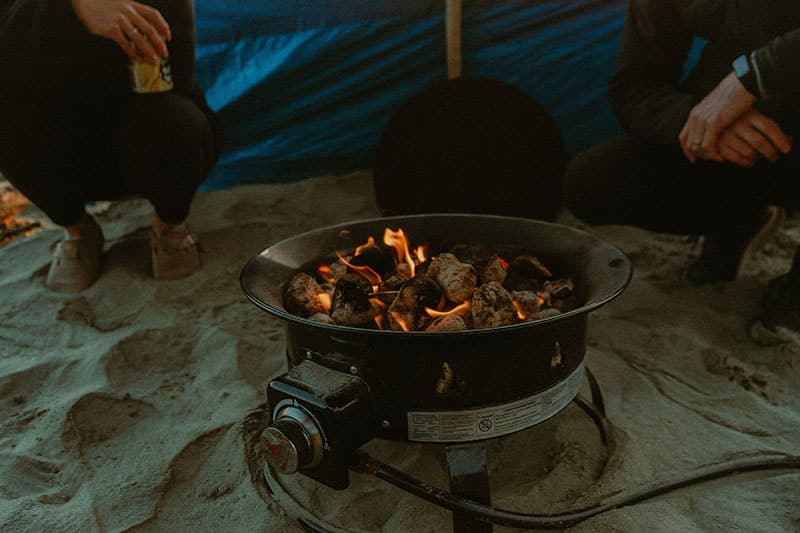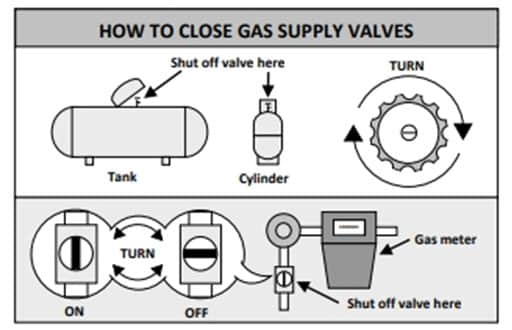Common Propane FAQs Answered by Propane Pros
Frequently Asked Questions
KNOWLEDGE IS POWER:
WHAT TO TAKE AWAY FROM THESE FAQs
Propane gas is a clean, affordable, and efficient way to heat your home, take a relaxing bubble bath, cook a tasty meal, or generate electricity in an emergency. For businesses of all types, propane is an easily transportable fuel source that cuts down on spending and reduces pollutants. It offers a number of positives, especially compared to other more destructive alternatives.
However, improperly handled liquid gas fuel can cause propane emergencies like gas fires, gas leaks, and explosions. Irresponsible uses of propane, sloppy storage of tanks, and failure to maintain or service propane equipment can cost you your home, business, property, or worst of all, your life.
You must follow propane safety best practices and use caution when handling tanks, fuel lines, appliances, and generators to maximize safety at all times. When used properly and handled in a responsible manner, propane is a safe and versatile fuel option for both commercial and residential use.
The frequently asked questions below are here to teach you about propane and to answer common questions we’ve heard from both business & residential customers. We’re providing this material in the hopes that this knowledge gives you the understanding necessary to use propane safely & successfully, and show what it can do for you.
If you need clarification about anything we addressed in this FAQ, require specific information about another topic we didn’t cover, or you’d like to find out which propane services will be right for you, please contact us directly. Our staff of local propane technicians will be happy to assist you.


FREQUENTLY ASKED QUESTIONS ABOUT PROPANE:
Learn About Propane and How You Can Use It
What is Propane?
Propane, also known as liquefied petroleum gas (LPG), is a highly versatile and efficient energy source commonly used in residential, commercial, and industrial settings all over the world.
At normal temperatures and pressures, propane takes the form of a gas. However, propane is typically compressed in tanks and stored as a liquid, leading to its classification as a liquid-gas fuel.
Is Propane a Clean Fuel?
Propane is an efficient energy source that delivers high energy output per unit. Propane is more efficient than most other sources of fuel commonly used to power our homes, appliances, vehicles, and industrial equipment.
Propane is known to be a cleaner, greener, more eco-friendly fuel option that’s better for the environment. In fact, propane’s fuel efficiency was documented over 30 years ago by the EPA and is an approved alternate fuel by environmental advocacy groups around the world.
Furthermore, propane’s increased efficiency translates to cost savings for consumers, businesses, and government organizations making propane a practical choice for anyone looking to stretch their fuel budget further.
Additionally, as a sustainable energy source, propane supports long-term energy needs that societies rely on to survive and thrive. The sustainability of and accessibility to energy sources offer our society a sense of security while providing vital resources & services to our growing population.
That’s why having access to low-cost energy-efficient fuels holds such great importance to families and organizations throughout our country. It’s no wonder that cities around the US continue switching their public transportation, school buses, and emergency response vehicles to operate on propane gas.
With substantial reserves available to tap into, propane can provide a stable and reliable energy supply for decades to come. Ultimately, propane’s potential to produce power at a lower financial & ecological cost makes it an energy-efficient alternative and a fantastic option to fuel your future!
Can I Use Propane During a Power Outage?
Yes, propane can be an excellent energy source during a power outage. Propane generators are particularly effective, providing reliable backup power for homes and businesses with greater efficiency and longer runtime compared to gasoline generators.
To maximize the benefits of propane during a power outage, it is essential to keep your propane tank adequately filled and consider investing in a propane generator.
Is Propane Toxic to Humans?
While propane is not harmful if inhaled in small amounts, it can be dangerous in high concentrations. Inhaling large quantities can displace oxygen in the air, leading to symptoms like dizziness, headaches, and in extreme cases, asphyxiation.
Propane is a nontoxic, colorless, and nearly odorless gas. However, an odorant is added to propane to help detect propane leaks easily, as it has no natural smell.
What Can I Use Propane For?
Propane’s versatility is one of its greatest strengths. For residential consumers, propane can heat your home, let you cook with gas stoves, heat water for a refreshing shower, or host a cookout using your propane BBQ grill.
Safely set the mood by lighting an indoor fireplace and cuddling up for a movie night with someone you love. Or light up that outdoor propane-powered fire pit and party with your favorite friends.
Propane also powers various types of small equipment used by homeowners and commercial operations. Machinery such as forklifts, lawnmowers, generators, and irrigation engines can all run on propane gas.
Propane for construction sites help provide heat that keeps workers warm when they can’t feel their feet. Public construction projects working to improve and repair infrastructure require propane to operate heavy machinery. Propane-powered lighting rigs brighten up dark areas ensuring the crew and people driving in construction zones remain safe from harm.
Meanwhile, campers go out in their RVs, all powered by propane gas tanks they got from conveniently located propane tank refill and exchange locations. They may use a gas camping grill to cook dinner for their family. Then whip out a propane-controlled campfire and roast marshmallows under the moonlight.
Propane’s adaptability, portability, and storability make it a safe, easy-to-use, inexpensive fuel source suitable for residential, commercial, industrial, and agricultural uses. No matter when, where, or why you need it, propane powers our lives with on-the-go energy on demand.
QUESTIONS ABOUT PROPANE TANKS & CYLINDERS:
Frequently Asked Questions Regarding Propane Containment Devices
What Should I Do if My Tank Runs Out of Gas?
Running out of propane can be inconvenient, but knowing the appropriate steps to take can ensure a quick and safe resolution. Here’s what to do if your propane tank runs out of gas.
For Businesses:
-
Contact Your Propane Supplier:
- Immediately notify your propane supplier. Many suppliers offer emergency delivery services to ensure you get a refill as soon as possible.
-
Shut Off All Propane Appliances:
- Turn off all propane appliances and equipment to prevent leaks when the tank is refilled.
-
Inspect for Leaks:
- Once your tank is refilled, have a professional inspect the system for leaks before restarting any appliances.
-
Schedule Regular Deliveries:
- To prevent future runouts, consider setting up a regular delivery schedule with your supplier or installing a remote tank monitoring system.
For Residential Users:
-
Turn Off Propane Appliances:
- Switch off all propane-powered appliances, including heaters, water heaters, and stoves, to avoid any potential leaks.
-
Contact Your Supplier:
- Reach out to your propane supplier to schedule a delivery. Inform them that your tank is empty so they can prioritize your request.
-
Safety Inspection:
- After the delivery, request a safety inspection from a certified technician to check for leaks and ensure everything is functioning properly.
-
Monitor Tank Levels:
- Regularly monitor your tank levels and consider automatic delivery options to avoid future interruptions.
For 5-Gallon Tank Users:
-
Disconnect Safely:
- Ensure all valves are closed before disconnecting your 5-gallon tank from any appliance or grill.
-
Transport to a Refill Station:
- Take your empty tank to a designated propane refill station. Ensure the tank is secured in an upright position during transportation.
-
Refill Process:
- At the refill station, allow the attendant to refill your tank. Most refill stations are equipped to handle small tanks safely and efficiently.
-
Reconnect and Test:
- After refilling, reconnect your tank to the appliance, open the valve slowly, and check for leaks using soapy water. If you see bubbles, there is a leak, and you should not use the tank until it is fixed.
What is the Typical Lifespan of a Propane Tank?
The lifespan of a typical propane tank can vary depending on its size and use. Small propane tanks, such as those used for grills, typically last around 10-12 years before needing re-certification or replacement.
Larger tanks used for home heating or commercial applications can last 30 years or more with proper maintenance and regularly scheduled service appointments from your local propane technician.
Is it Safe to Use an Expired Propane Tank?
No, it is not safe to use an expired propane tank. Propane tanks have an expiration date because, over time, the materials and components can degrade, increasing the risk of leaks, malfunctions, or even explosions.
Using an expired propane tank can lead to several safety hazards. The integrity of the tank may be compromised, leading to potential leaks that can cause fires or explosions. Additionally, the valve and other components may no longer function correctly, increasing the risk of gas escaping.
If your propane tank has expired, take it to a certified propane dealer or supplier who can inspect and, if possible, re-certify it. If re-certification is not an option, they will guide you on proper disposal and help you acquire a new, safe tank.
How Do I Dispose of an Old or Damaged Tank?
Disposing of old or damaged propane tanks must be done carefully to avoid safety hazards and prevent propane emergencies.
The first step is to contact your propane supplier, as many suppliers offer tank recycling and disposal services. You can also check with your local hazardous waste disposal facility, which often accepts old or damaged propane tanks for safe disposal.
Some retailers have propane tank exchange programs where you can trade in your old tank for a new one. Never attempt to puncture, incinerate, or throw propane tanks in the trash, as this can cause explosions or fires.
Always follow local regulations and guidelines for disposing of propane tanks to ensure safety and compliance with environmental laws.
Are Propane Tanks & Cylinders the Same Thing?
While the terms “propane tank” and “propane cylinder” are often used interchangeably, there are some differences, mainly related to their size, use, and design.
Propane cylinders are generally smaller and portable, with common sizes including 1-pound, 5-pound, 20-pound, 30-pound, and 40-pound options. These cylinders are designed for easy transport and mobile uses for applications like camping stoves, barbecue grills, patio heaters, and small outdoor appliances.
In contrast, propane tanks are larger and meant for stationary use. Common sizes include 100-pound, 120-gallon, 250-gallon, 500-gallon, and 1,000-gallon tanks. These tanks are designed to hold a larger volume of propane, making them suitable for long-term, continuous supply needs such as home heating, water heating, cooking, and fueling commercial & industrial equipment.
LPGs & LIQUID GAS FAQs:
Liquified Petroleum Gas – The Fuels of the Future
What is a Liquid-Gas?
LPG fuels like propane, classified as “liquid gases”, possess the unique ability to change their state of matter from gaseous to fluid. This change occurs when factors like temperature & pressurization of LPGs are manipulated, often for storage or transportation.
Once cooled & pressurized, liquified petroleum gases like propane are stored in steel or aluminum tanks known as cylinders. These tanks come in many sizes and setup options designed to meet the needs of both residential & commercial consumers.
Where Do LPGs Come From?
Liquid gas fuels are primarily obtained as a byproduct from industrial processing of natural gas & oil. However, renewable liquid gases created by recycling carbon & processing waste materials, are gaining popularity.
-
Natural Gas Processing: During the extraction and processing of natural gas, LPGs such as propane are separated from the raw natural gas stream. This involves cooling the natural gas to condense and remove heavier hydrocarbons. Finally, the gases are further refined & purified to produce commercial-grade propane fuel.
-
Crude Oil Refining: LPGs are also produced while refining crude oil. During this process, crude oil is heated in a distillation column, causing it to separate into different components. LPGs, being lighter than other elements, rise to the top and are extracted. Finally, the gases are treated to remove impurities, resulting in high-quality propane.
- Renewables: In addition to conventional LPGs derived from natural gas and crude oil, there is a growing focus on creating renewable LPGs. These liquid-gas fuels are produced from sustainable sources such as biomass, waste materials, and other renewable feedstocks. The production process involves:
-
Feedstock Collection: Renewable feedstocks, including agricultural waste, plant materials, and other organic waste, are collected for processing.
-
Conversion: These feedstocks are then converted into renewable LPG through various processes such as gasification, fermentation, and catalytic conversion. These processes break down the organic materials and reform them into LPG molecules.
-
Purification and Liquefaction: Similar to conventional LPGs, renewables undergo purification processes to remove impurities. It is then liquefied under moderate pressure for storage and transportation.
-
Are LPGs Efficient Sources of Fuel?
Yes, LPGs are considered one of the best fuel options for anyone looking for a clean-energy solution. In fact, propane, a widely used LPG, is listed as an approved fuel in the Environmental Protection Agency’s 1990 Clean Air Act.
Propane is an energy-rich fuel source offering clean-burning high-heat flames. This means propane and similar LPGs produce energy at a higher rate of efficiency than other commonly used fuels like oils, coal, natural gas, diesel, and petrol.
Therefore, LPGs provide superior sources of power generation – an ideal option for rural customers who need residential propane for homes and businesses looking to schedule automated propane delivery services.
How Do I Properly Store LPGs?
Safe and proper storage methods for LPGs vary depending on the device, location of use, and the use case. In other words, safely managing & monitoring liquified petroleum gas has a lot to do with what it’s filing and where it should be operated in the first place.
Below you’ll find common rules of thumb and best practices for handling residential & commercial LPG storage in various locations.
Indoor Storage:
Residential:
- Use Approved Containers: Always store LPG in approved and certified cylinders designed for indoor use.
- Ventilation: Ensure the storage area is well-ventilated to prevent gas accumulation. Avoid enclosed spaces such as basements or closets.
- Keep Away from Heat Sources: Store LPG cylinders away from sources of heat, sparks, or open flames.
- No Smoking: Prohibit smoking near storage areas to avoid accidental ignition.
- Regular Inspections: Check for leaks or damage regularly. Use soapy water to test connections for leaks, and never use a flame.
Commercial:
- Designated Storage Areas: Store LPG cylinders in designated, ventilated areas away from workspaces and high-traffic zones.
- Compliance with Regulations: Follow all local safety codes and regulations for indoor storage of LPGs.
- Safety Signage: Clearly mark storage areas with appropriate safety signs and instructions.
- Secure Cylinders: Ensure cylinders are stored upright and secured to prevent tipping or damage.
Outdoor Storage:
Residential:
- Weather Protection: Store LPG cylinders in a shaded area to protect them from direct sunlight and extreme weather conditions.
- Stable Surface: Place cylinders on a stable, flat surface to prevent tipping.
- Distance from Buildings: Keep cylinders at least 3 feet away from building openings such as windows, doors, and vents.
- Away from Ignition Sources: Store cylinders away from sources of ignition, including electrical appliances and open flames.
Commercial:
- Fenced Storage Areas: Use fenced or secured areas to store LPG cylinders, preventing unauthorized access and ensuring safety.
- Proper Labeling: Label the storage area with appropriate hazard signs and safety instructions.
- Periodic Checks: Conduct regular inspections of the storage area and the condition of the cylinders.
- Fire Safety Measures: Equip the storage area with fire extinguishers and ensure that staff are trained in emergency procedures.
How Can LPGs Benefit Me or My Business?
Liquid Gas like propane is especially beneficial to rural communities with less energy infrastructure or customers located outside the gas grid. If you live in or operate an industrial operation in a remote area of Northern Nevada, liquid-gas fuels like propane are an efficient energy option worth exploring.
LPGs can easily replace old, outdated, inefficient, or expensive fossil fuel & heating oil systems in homes and businesses. Additionally, propane is a versatile LPG that can power vehicles & machinery. As a result, liquid gases provide both primary & secondary energy options for residential and commercial customers just like you.
How Do You Close Gas Supply Valves on Tanks & Cylinders?
Locate the Valve:
For propane cylinders, the valve is on top of the cylinder with a round, knob-like handle. For residential propane tanks, the main valve is typically found near the top of the tank, often under a protective cover.
Turn Off Any Connected Appliances:
Make sure all appliances connected to the propane supply, whether from a cylinder or a tank, are turned off and no gas is flowing.
Close the Valve:
Turn the valve handle clockwise (to the right) until it stops. This applies to both propane cylinders & tanks. The handle should turn until it is fully closed.
Check for Leaks:
After closing the valve, inspect the valve and connections for any potential leaks. Apply a soapy water solution to the valve area.
If bubbles form, there’s a gas leak. If you detect a leak, do not use the propane and contact a professional immediately.
Safety Precautions:
If you’re closing the valve due to an emergency, avoid using open flames or electrical switches near the propane source. If you suspect a gas leak, evacuate the area and contact your propane supplier for assistance.

Contact Granite Propane
As a family-owned local propane company in Silver Springs, Nevada, Granite Propane strives to provide a personalized client relationship that offers the safest, most reliable, friendliest, and most responsive propane services near you and to the surrounding communities of rural Northern Nevada. Contact us now and let us know how we can help.
NOTICE: If you're experiencing a propane gas fire, gas leak, heavy equipment accident, or other propane emergency, please call 911 for immediate assistance!
We can be reached 24/7 at our after-hours service number:
(385) 264-7221
Contact us with inquiries Monday through Friday, 8 AM to 5 PM:
(775) 577-2361
Closed 5 holidays a year, as well as Saturday & Sunday.
If you have questions not answered on our FAQ page, want to inquire about additional propane service areas, or have specific propane-related decisions you need assistance making, fill out this contact form. A member of our staff will get back to you.
